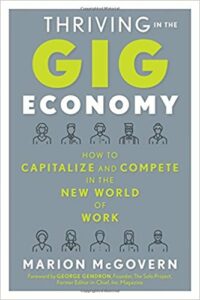Introducing the New World of Work
Work is changing.
Technology continues to change everything, and work is no exception. In just a few years, we have seen companies emerge from Uber to Instacart. New digital platforms are emerging that explore different business models.
Marion McGovern founded M Squared Consulting and Collabrus. Her new book Thriving in the Gig Economy: How to Capitalize and Compete in the New World of Work, is a thoughtful exploration of the new world of work. Whether you’re looking to make some extra money or you’re in management, you will want to familiarize yourself with these trends.
Gig and the New Economy
What is the Gig Economy?
Before I answer that question, let’s clarify the meaning of the word “gig.” The term was first used with jazz musicians in the 1920s, where they would book one club for a week and another for a few days in a different club across town. A gig referred to work that could vary in duration and was for a variety of employers. So gigs have been around for a long time. I started my company, M Squared Consulting, in 1988 to match independent consultants with projects. It was a gig economy company long before the term had even been coined. The “Gig Economy” refers to the people who work independently for a variety of entities as well as the companies that enable that work, both the new digital talent platforms, as well as traditional intermediaries and staffing companies. Additionally, you could include the vast eco system that has sprung up to support this work, including co-working space, productivity apps, collaboration tools, and financial service products targeted at the independent workforce.
A few years ago, you received two calls that got your attention in a new way. How did that alter your thinking?
Actually there were three random and unrelated calls from venture capitalists and private equity guys who wanted to talk to me about digital talent platforms. One idea was for a platform for professional moms who wanted to work flexibly after the kids were older. Another was to build a pool of on-demand oil field services workers in Western Africa, and the third was to create a product to hire recent college graduates into entry level management positions in a way that would require no human intervention. All of the players were technologists who had never run a service business, let alone a people-intensive one. Much of the magic was to be in the algorithms which would match talent and opportunity seamlessly and quickly. Many of the fairly basic questions I asked—like who would hire the moms? Would they be employees or contractors? And how would the platform make money?—had not yet been answered. I was struck by the disconnect of talent being the most important thing to the success of an organization, but nonetheless the goal was to eliminate humans in the process of securing that talent. It inspired me to take a much deeper dive into the burgeoning world of digital talent platforms.
How is the Gig Economy growing?
The growth in the gig economy is a story of technology, culture and demographics. As I said, gigs have been around a long time, but now we have the significant advances in technology that enable major cloud-based platforms. These, of course, are the products of prior developments in telecommunications technology and bandwidth advances. Couple that with the big data side of thing which allows data scientists to come up with algorithms to match buyers and sellers, and market opportunities emerge.
However, that is just the operational side of things. There is a cultural dimension here, too. We have come to trust systems that make our lives easier. Think back 15 years. Would you ever have gotten into a car with a stranger and let him/her know where you lived? Now it’s a normal way of life. Although it is more true in the business-to-consumer world than the business-to-business one, we are willing to let different platforms suggest music we would like, a restaurant we should visit or the best pair of shoes to buy. Why wouldn’t we let a platform find us a plumber, too?
Demographics also factor into this. In 2016, the Millennials overtook the Boomers as the largest cohort in the independent/gig workplace…but not by much. (This according to the annual study by MBO Partners, “The State of Independence in America.”) 38% are Boomers who are highly accomplished and high earners as well as retired and working less intensively. Boomers historically have shown a bias for self-employment, so the entrepreneurial dimension of working independently plays to that strength. At 40% of the 41 million independent workers, Millennials too want flexible work and, perhaps more importantly, they want to work on their terms. Although they tend to be less satisfied than the Boomers, in part because they earn less since they have less expertise, they are happy to use gig work to gain new and different skills so they can navigate their career of choice. In absolute numbers though, both of these groups are increasing their participation.
Given all this, the trend will surely continue.
What do you expect in the next several years?
There are some structural issues that need to be addressed, not the least of which is the social safety net. Many people deride the growth of the gig economy, since they see it as a spot for low wage work that has no career path and no access to traditional benefits, which has become part of the fabric of America. (That said, though, the argument may rely on an overly generous view of historical employee benefits. According to Steven King of Emergent Research, back in the 50s and 60s when there were very generous healthcare and retirement packages for traditional employees, fewer than 40% of the population was covered by them. Today workers covered by employee plans are closer to 50%.)
Part of the problem is we still have ambiguity in the key body of law that governs the gig economy, which is around the definition of an employee and a contractor. The IRS has 20 points that define an independent contractor, but they need not all be true, and most are highly subjective. And to make it even more messy, other agencies like OSHA, use their own definitions. This means making the determination about the employment status of a worker is very gray.
Perhaps not surprisingly, several digital platform companies have been sued because they elected to treat gig workers like employees. Some went out of business, like Homejoy, a house cleaning service backed by $40 million in venture capital money. Others have changed their models, like the car valet firm Luxe and Munchery, a meal delivery service. Perhaps the most important case is the action against Uber. As someone who watches this issue closely, I am glad that a high visibility company is facing what will inevitably be a court battle, since it may mean there will finally be a reasoned answer and potentially more clarity around the independent contractor employee issue.
In the meantime, there are smart people at work on the problem. The Brookings Institution has sponsored a study which advocates creating a new status of worker, the dependent contractor, which would accord some of the social safety net benefits typically offered to employees. Another notion is the idea of creating a “Certified Self Employed” designation which would last for three years, and offer clarity to both employers and workers.
Senator Mark Warner introduced a bill to investigate portable benefits for the gig workers. The idea here is that if someone works a certain amount of time for one platform he/she should be able to have fees paid into a benefit pool that would be prorated by the number of hours he/she worked. The bill suggests piloting several approaches in 2018 and evaluating the best options in 2019. Some firms are not waiting for the government to figure out the best program. Care.com has initiated an optional benefits option for its independent workers.
What are some of the characteristics of successful gig workers?
Gig work is not for everyone. By definition, it entails somewhat more risk, since an independent worker needs to keep finding new clients and projects. Psychologists have said that this risk profile suits about 40% of the US population. So assuming you have a tolerance for some level of risk, what else do you need?
The Solo City Project, an effort launched by the Knight Foundation in 2015, looked at this issue in detail. It visited the cities in America with the largest independent worker hubs and interviewed workers, clients, public servants, economists and advocates about how this trend can best be supported. It cited several characteristics of successful gig workers. Perhaps chief among them was grit, the ability to accept setbacks, learn from mistakes and demonstrate resilience. Similarly, a tolerance for ambiguity was also important. There was a decided networking bias, where collaboration skills, communication skills, and willingness to get help also was critical. Creative problem-solving skills as well as financial literacy point to opportunities for our education system in preparing the next generation of independent workers.
One attribute that may not get enough visibility is self-awareness. Being an independent is isolating. Couple this with the fact that gig workers often work remotely, and it can be a lonely road. Individuals need to motivate themselves and keep themselves engaged on the project but also engaged in the work. In the skilled ranks, they need to keep up with the latest developments in their field. They must have the business development skills to get out and meet people at events and seminars. As I often advise rookies, people buy from people, so even though digital branding is important, being out in the world is, too.
How do you stand out from the competition in the Gig Economy?
For those choosing the gig route as a career, it is important to establish your personal brand. Why should clients buy from you? What is your special sauce? It is important to be thoughtful about this because for a marketing consultant for example, just saying, “I deliver great results on marketing projects” doesn’t do it; those are the table stakes — all of the marketing consultants out there do that. In my book I present several different ways to think about your personal branding, from a personal SWOT analysis to the RAPTURE methodology. Once you create that brand, it is important to expand upon it in the digital world. You won’t get a gig because of your Linked In profile, but you might not get the gig if your Profile is not up to snuff.
Maintain Your Independence
You spend some time on taxes and maintaining your independence. Why is this important? Would you share a tip or two on how to maintain it?
The tax issue revolves around the employment status question and, again, that is messy. Workers should understand their options because it affects their tax bill. As an employee, you can’t deduct the cost of going to work. As a consultant, travelling to your client’s site is a business expense. (At least now…this has been suggested as a tax loophole that may be closed.)
In the current environment, the answer to the employment question may be dependent on the nature of the work and your relationship with the client. Is the client directing and controlling your work? Do you have other clients? Do you have an investment in your business with a website or brochures?
If you want to be independent, first get some advice from a financial and/or tax advisor. Many people set up a separate company, which could be anything from a name, i.e. Marion McGovern Consulting, to a corporation. Whatever you do, be sure to know your tax obligations. You will not be earning a salary. Instead, you will collect fees, and your income will be reported on a form 1099 at year end. Additionally, independents need to file estimated income taxes quarterly, so again, check with your financial advisor.
If you are open to other options or if your clients want you to be employed, there are several great firms out there, like MBO Partners, who employ consultants during their gigs. Most offer access to benefits depending on the situation. In these cases, you would receive a W2 and your taxes would be deducted from your pay.
How do you see the Gig Economy transforming the “traditional” career?
 I’ll guess the question is what is a traditional career? As a boomer, the career path that was looming in my college days was getting a job with a big corporation that would train you and where you would stay for at least 3-5 years. Nowadays, many millennials think one year may be too long.
I’ll guess the question is what is a traditional career? As a boomer, the career path that was looming in my college days was getting a job with a big corporation that would train you and where you would stay for at least 3-5 years. Nowadays, many millennials think one year may be too long.
The famous Irish economist, Charles Handy, is in his 1989 book, The Age of Unreason, suggested a perfect transformation metaphor. He likened the role of the corporation in shaping careers to that of the British Army. Everyone would enter and receive a modicum of training. Some recruits would leave in a few years, others in 5 and others in 10. That said, everyone knew going in that only very few would remain and ultimately become the generals. So potentially this is the model of today. Entry level workers will enter a company and get some degree of training. I would argue that providing even more training is a real opportunity for companies to differentiate themselves as not just an employer of choice but a client of choice. Workers will move on to other firms and potentially to the gig world, through which they may end up back at their first employer as a consultant—all the more reason for companies to be sure they become the clients of choice.
For more information, see Thriving in the Gig Economy: How to Capitalize and Compete in the New World of Work.

